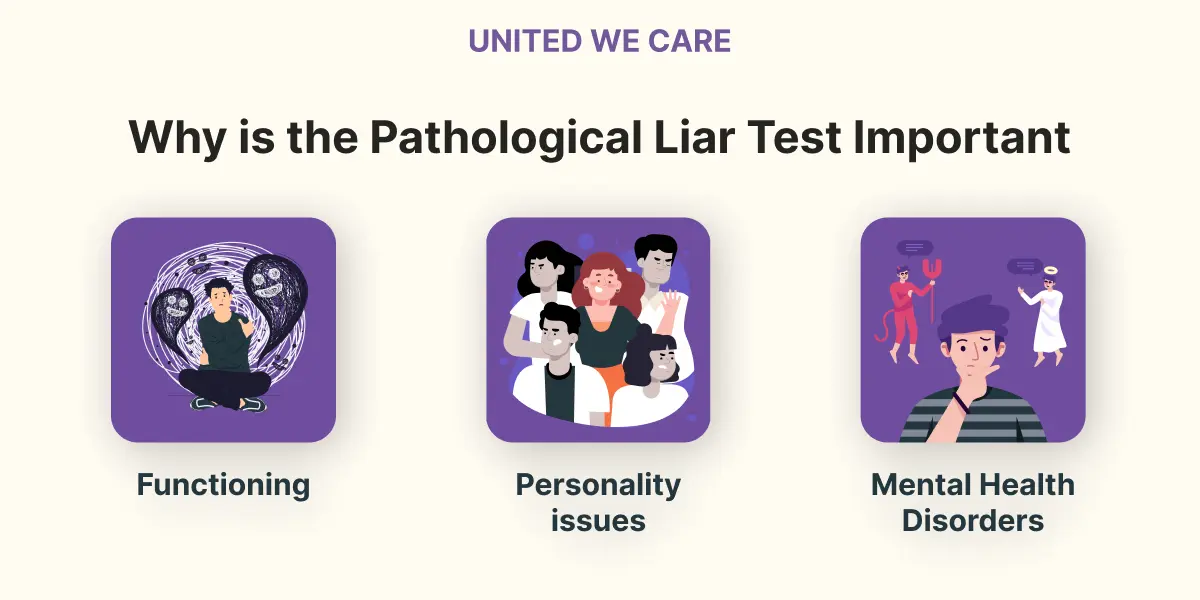Introduction
Even though lying itself is not considered dangerous, pathological lying can have detrimental effects on your well-being. Pathological lying refers to the illness where a person feels compelled to lie excessively, continuously, and to no merit.
To measure pathological lying, researchers have designed specific tests.
Let’s find out more about the test associated with pathological lying.
What is a Pathological Liar Test?
Ideally, a pathological liar test is an assessment designed to confirm and measure the intensity to which someone lies. However, there can be several challenges in creating an accurate measure of pathological lying. Since pathological lying is not a part of a specific diagnosable illness, several factors have to be kept in mind.
In essence, a good test should be able to indicate and confirm the tendency to lie persistently. Moreover, the test should be able to differentiate between lying in other terms and pathology-origin lying. Due to the lack of medical research in this area, there are very limited scientific assessments available that can be used.
Admittedly, due to the difficulties mentioned above, self-testing might be the most convenient option to measure pathological lying. Self-testing requires finding out if you meet the fundamentals of pathological lying or not. Similarly, reaching out to experts in the area of mental health for a detailed evaluation is another method.
Why is the Pathological Liar Test Important?
As compared to other forms of lying, pathological lying could indicate several difficulties. While regular lying is calculated and occasional, pathological forms of lying could be uncontrollable. They might create disturbances in other aspects of well-being. The important aspects that can be addressed by a pathological liar test are mentioned below.

Functioning
Firstly, lying in several different areas of your life can create issues in maintaining a correct narrative. This can significantly impact both social and occupational functioning. People around someone who lies pervasively avoid them or have very limited contact due to trust issues.
Similarly, in relationships, a pathological liar will have trouble finding reliable bonds. Family, friends, and partners of a liar will have issues in figuring out the pathology behind lying and might see it as malice instead.
Personality issues
Secondly, lying is rarely a standalone concern. When pathological lying goes unnoticed, it can change and influence the personality of an individual. Covering up your lies, being deceitful, and overall inconsistencies become second nature. Moreover, pathological lying could be one aspect of a larger complicated personality makeup.
Also, childhood trauma and abuse could also point to feelings of insecurity and lack of safety. These feelings could lead to developing habitual lying as an adult as a safety or defense mechanism in reaction to childhood trauma.
Mental Health Disorders
Thirdly, certain mental health conditions can compel an individual to develop pathological lying as a symptom. Mental illnesses such as depression, anxiety, and post-traumatic disorder are associated with it. These disorders create difficulties in having a stable narrative in the mind of a person and result in lying to cover up the inconsistencies.
Particularly, certain personality disorders are correlated to pathological lying as a symptom. For instance, antisocial personality disorder has lying and deceit as one of the diagnostic criteria in its manuals.
How to do a Pathological Liar Test?
As mentioned above, a pathological test can be difficult to conduct due to a lack of medical resources. In spite of this, some options are available. The methods mentioned below can help confirm pathological lying in an individual.
Self Assessment
Precisely, self-assessment is the most convenient yet prone to be vague and biased. If you suspect that you or a close one might be pathologically oriented to lie, look for some of the below-mentioned signs:
- Feeling compelled to hide or alter information
- Telling dramatic or highly unlikely stories without any cause or trigger
- Anxious or impulsive talking
- Interrupting others for including yourself in false narratives
- Going to extreme lengths to maintain lies
Essentially, it can be tough to identify if the lying is rooted in pathology. Finding alternate measures to support your conclusions will be ideal in such a scenario.
Expert Consultations
As pathological lying is rooted in a pathology, i.e., a disease-related origin, expert help would lead to accurate assessment. It is important to remember to seek out experts who specialize in mental health disorders, personality afflictions, etc. Professionals, including psychiatrists and clinical psychologists, can assess pathology through clinical judgment, survey assessments, and personality inventories.
Common psychological evaluations of pathological lying include the survey of pathological lying, lie detector test, Rorschach Inkblot test, and many others. Assessments require careful consideration of the expert and are conducted by a trained professional only.
Conclusion
Conclusively, it is necessary to assess pathological lying if the signs are present. This can help in improving the well-being and relationships of the person prone to pathological lying. There are several mediums of assessment, both by self and with the help of experts.
If you suspect that someone around you might be a pathological liar, read this article to learn more about how to spot a liar. Alternatively, if you are looking for a repository of professionals, guides, and blogs that can help you with such concerns, reach out to the United We Care App.
References
[1] D. A. Curtis and C. L. Hart, “Pathological Lying: Theoretical and Empirical Support for a Diagnostic Entity,” Psychiatric Research and Clinical Practice, vol. 2, no. 2, Oct. 2020, doi: https://doi.org/10.1176/appi.prcp.20190046.
[2] D. A. Curtis and C. L. Hart, “Pathological Lying: Psychotherapists’ Experiences and Ability to Diagnose,” American Journal of Psychotherapy, vol. 75, no. 2, p. app.psychother, Jul. 2021, doi https://doi.org/10.1176/appi.psychotherapy.20210006.
[3] D. Djuric-Jocic, N. Pavlicic, and V. Gazivoda, “Pathological lying and tasks of psychological assessment,” Vojnosanitetski pregled, vol. 75, no. 2, pp. 219–223, 2018, doi: https://doi.org/10.2298/vsp151213243d.





